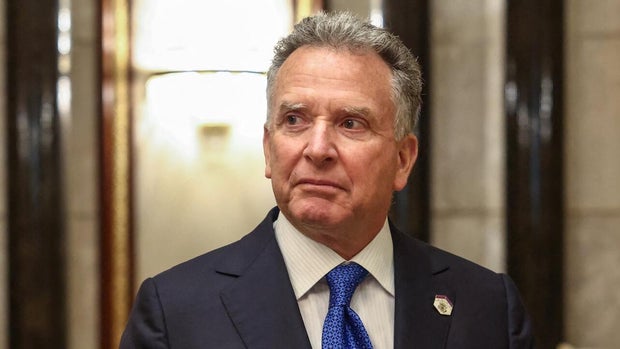Jerusalem — Israeli and Hamas officials said Tuesday they have reached an agreement to exchange the bodies of dead Israeli hostages for the release of hundreds of Palestinian prisoners, keeping their fragile ceasefire intact for at least a few more days.
Israel has delayed the release of 600 Palestinian prisoners since Saturday to protest what it says is the cruel treatment of hostages during releases by Hamas. The terrorist group has said the delay is a “serious violation” of the ceasefire and that talks on a second phase are not possible until the prisoners are freed.
The deadlock had threatened to collapse the ceasefire when the current six-week first phase of the deal expires Saturday. But late Tuesday, Hamas said an agreement had been reached to resolve the dispute during a visit to Cairo by a delegation headed by Khalil al-Hayya, a top political official in the group.
The breakthrough appeared to clear the way for the return of the bodies of four more dead hostages and hundreds of additional Israeli-held prisoners scheduled to be released under the ceasefire, but the exact date of the exchange remained unclear.
The prisoners previously slated for release “will be released simultaneously with the bodies of the Israeli prisoners who were agreed to be handed over,” along with the release of a new set of Palestinian prisoners, Hamas said in a statement.
An Israeli official, speaking on condition of anonymity because he was not authorized to speak to the media, confirmed an agreement to bring home the bodies in the coming days. He gave no further details.
Israeli media reports said the exchange could take place as soon as Wednesday. The Ynet news site said the Israeli hostages’ bodies would be handed over to Egyptian authorities without any public ceremony.
Hamas has released living hostages, and the bodies of four dead hostages, in large public ceremonies during which the Israelis were paraded and forced to wave to large crowds. Israel, along with the Red Cross and U.N. officials, have said the ceremonies were humiliating to the hostages, and Israel last weekend delayed the scheduled prisoner release in protest.
The latest agreement would complete both sides’ obligations of the first phase of the ceasefire — during which Hamas is returning 33 hostages — including eight bodies — in exchange for nearly 2,000 Palestinian prisoners.
It also could clear the way for a likely return visit to the region by the White House’s Mideast envoy, Steve Witkoff.
EVELYN HOCKSTEIN / POOL / AFP
He told an event in Washington for the American Jewish Committee Tuesday that Israeli representatives were en route to talks on the next phase of the ceasefire deal, and he repeated that he was also ready to head back to the region, according to AgenceFrance-Presse.
“We’re making a lot of progress. Israel is sending a team right now as we speak,” Witkoff said, adding that talks could resume in Cairo or Doha, the capital of Qatar.
Witkoff has said he wants the sides to move into negotiations on the second phase, during which all remaining hostages held by Hamas are to be released and an end to the war is to be negotiated. The Phase 2 talks were supposed to begin weeks ago but never did.
The ceasefire, brokered by the U.S., Egypt and Qatar, ended 15 months of heavy fighting that erupted after Hamas’ Oct. 7, 2023, terrorist attack that killed some 1,200 people in Israel, during which about 250 people were taken hostage.
Israel’s military offensive has killed over 48,000 Palestinians, according to Palestinian health officials, displaced an estimated 90% of Gaza’s population and decimated the territory’s infrastructure and health system. The Hamas-run Health Ministry does not differentiate between civilian and militant deaths, but it says over half the dead have been women and children.

